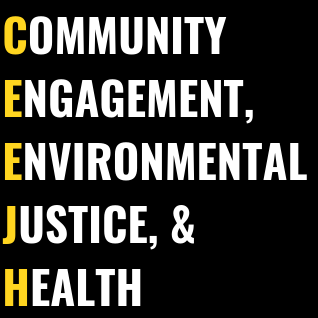THe University of Maryland Symposium on Environmental Justice and Health Disparities
The CEEJH team is currently planning the 9th Annual University of Maryland Symposium on Environmental Justice and Health Disparities. This year, the event will be divided between in-person and virtual sessions and take place from Monday, September 11th to Saturday, September 16th, 2023. The sessions on September 11th, 12th and 15th will be online, the sessions on September 14th will be available online and in person, and the session on September 16th will be in-person at the University of Maryland.
The Symposium theme this year is “People, Power, & Politics”.
The first UMD EJ Symposium (as it is informally known) took place on Saturday, December 1, 2012 and was organized by Dr. Sacoby Wilson with support from Mustafa Santiago Ali (then Associate Director of the US EPA Office of Environmental Justice) and Leslie Fields (National Environmental Justice Director for the Sierra Club). This intersection of academic, government, and non-profit sectors for the purpose of providing environmental justice community stakeholders with a space to convene and network was the first of its kind in the DC-Maryland-Virginia region.
Check out the 2022 Agenda!
Get to know our speakers and their contributions to Environmental Justice, Health, Climate Change efforts and Energy Transitions!
Click the link for more!
While specific topics and sessions vary from year to year, the conference’s overarching focus remains on environmental justice issues (and actions) relevant to the DMV region and beyond. In the last 11 years, conversations have included sustainability in the Chesapeake Bay watershed; grassroots activism; health, law, and policy tools for environmental justice communities; STEM innovations for empowering community stakeholders and more. Symposium mainstays include: food justice, energy equity, children’s environmental health, community capacity-building, built environment and social determinants of health, air pollution, and equitable development and community revitalization, among others. With feedback over time, the symposium has moved towards providing more workshops and hands-on training sessions to further empower community members and allies. Each symposium draws hundreds of attendees and speakers from diverse backgrounds.
Archived content from previous symposia:
7th University of Maryland Symposium on Environmental Justice and Health Disparities (2021)
6th University of Maryland Symposium on Environmental Justice and Health Disparities (2020)
5th University of Maryland Symposium on Environmental Justice and Health Disparities (2019)
4th University of Maryland Symposium on Environmental Justice and Health Disparities (2018)
2nd University of Maryland Symposium on Environmental Justice and Health Disparities(2014)
1st University of Maryland Symposium on Environmental Justice and Health Disparities (2012)


